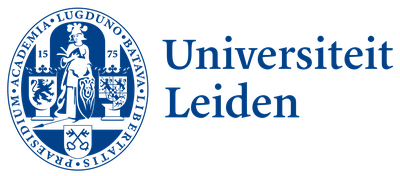The Project
Neanderthals and Us
"Neanderthals and "us": how the golden age of Neanderthal research challenges human self-understanding" as a collaborative project of Erasmus University Rotterdam, Leiden University and the Neanderthal Museum (2023-2025).
2023
This interdisciplinary project combines expertise from Paleolithic archaeology and philosophy to explore how changes in Neanderthal research and creative genres (exhibitions, novels, films, cartoons) challenge our understanding of ourselves as humans.
Our image of Neanderthals is changing rapidly and drastically. Until recently, Neanderthals were considered inert brutes, and research focused on differences (anatomical, genetic, psychological, and cultural) between "them" and us. Increasingly, however, Neanderthals are thought to have been capable of "typically human" practices: for example, language, ritual, grooming, music, or symbolism. Neanderthals are thus increasingly seen as human beings equal to us Homo sapiens sapiens.
Together with a citizens' panel, the question of what we understand by "human" and how our image of "human" changes when we learn more about other human forms is to be explored. The Paleo experts are a supporting element in the participatory research. Participants bring new, broader perspectives and ways of thinking to the professional discussion. Together with researchers from the universities and the museum, they are in constant exchange through thematic workshops on Paleolithic archaeology, Neanderthal stereotypes and Neanderthal reconstructions.
For the Paleo experts 20 interested citizens could be found, which are composed of different age groups. In a total of six meetings the Paleo experts will get to know each other, the working methods of archaeology and the Neanderthal better.
The project is made possible by the Nederlandse Organisatie voor Wetenschappelijk Onderzoek (NWO, Dutch Organization for Scientific Research).
2024
Our research year commenced with a particularly significant event: in order to further refine our research objectives and methodologies, as well as gather diverse perspectives, we organized our inaugural Advisory Board Meeting in April 2024. Invited were three scholars who possess specialized knowledge on Neanderthal reseearch and science communication. The aim of those reoccuring Board Meetings in our project is to provide advisory support for our research and to offer fresh insights for both the Ph.D. students (Susan Peeters and Karel Kuipers) and the Citizens' panel.
Our esteemed guests at the Board Meeting included:
Dr. Bärbel Auffermann, a prehistoric archaeologist and the director of the Neanderthal Museum in Mettmann. Both she and the Neanderthal Museum have been dedicated for decades to dispelling the stigma and myths surrounding Neanderthals through communicating and conducting modern research. The museum's objective is to present Neanderthals as humans to the museum visitors and to promote the complexity of evolution and human origins.
Dr. Rebecca Wragg Sykes, a British archaeologist and author, who has extensively studied our extinct relatives. In her book "Kindred: Neanderthal Life, Love, Death and Art," Rebecca Wragg Sykes endeavors to portray the Neanderthals in all their dimensions, from the paleo-romantic to the more somber aspects. She underpins these literary narratives with archaeological expertise and examples from Neanderthal research.
Sanjin Mihelić, currently the director of the Museum of Arts and Crafts in Zagreb, Croatia. Until recently, he served as the director of the Archaeological Museum in Zagreb, focusing on the Middle Paleolithic cultural artifacts of Croatia, particularly those of the Neanderthals. Collaborating with members of the iNEAL group, he contributed significantly to networking and exchanging research findings over the past year.
Overview of publications
Julien Kloeg and Hub Zwart (2024) Neanderthals and us: connecting human evolution and philosophical anthropology. International Yearbook for Philosophical Anthropology / Internationales Jahrbuch für philosophische Anthropologie Volume 12
Hub Zwart, Marie Soressi (2024) Neanderthals and us: Towards a philosophy of deep history. In: Kloeg & Zwart (above)
K.J. Kuipers, J. Kloeg, M.A. Soressi (2024) What is ‘human’ in human evolution: Reconnecting philosophical anthropology and human evolution. In: Kloeg & Zwart (above)
Susan Peeters, Marie Soressi, Stine Jensen, Hub Zwart (2024) Close encounters of a human kind: On the need for distinction versus the longing for connection in Neanderthal – Homo sapiens encounters in science fiction. In: Kloeg & Zwart (above)
Anna Riethus, Dustin Welper, Melanie Wunsch (2024) Neanderthals and the public: How to start a conversation on our human past. In: Kloeg & Zwart (above)
Hub Zwart, Susan Peeters, Karel Kuipers, Marie Soressi (2025) When Neanderthals and modern humans coexisted: towards a more inclusive understanding of deep human history. In: Mathilde Lequin, Juan Manuel Rodríguez Caso (eds.) The Field of Human Evolution Viewed from Critical History and Epistemology. Springer/ Nature Book Series “Evolutionary Biology: New Perspectives on its Development”.
Susan Peeters (2024) Neanderthals and the issue of masculinity. The role of gender in popular neanderthal discourse. Peeters, Susan, and Hub Zwart. To appear in: Alterity and Human Evolution: Deep Time and Multispecies Perspectives on Difference and Variation, edited by O. Moro Abadía and M. Porr, Berghahn books (accepted)
Karel Kuipers (2025) The problem with ‘Symbolic Behaviour’ (to be submitted)
Conferences and presentations
European Association of Archaeologists (BELFAST, Northern Ireland 2023)
The problem with reconstructions of symbolic behaviour in the palaeolithic; How dualistic thinking still creates problems in the theoretical framework
In the discussion about the ‘humanness‘ of other hominins, most notably the Neanderthals, the idea of symbolic mediated behaviour plays a big role. I however have argued in my talk that we can never be sure whether and artefact is a symbol: a symbol relies on socially arbitrary conventions. A symbol is an interpretational process, not an artefact, making the concept problematic. Other than that, I had a great time exploring the city and meeting some really cool people both in and out conference hours.
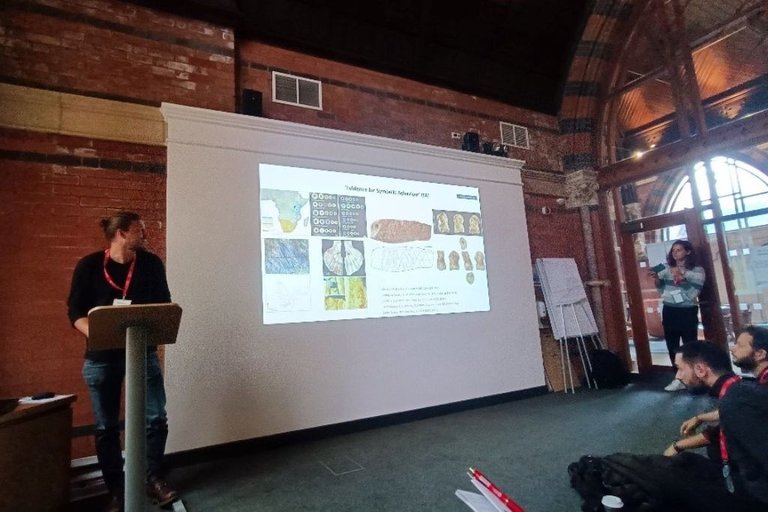
Karel Kuipers
Close encounters of a human kind. Distinction versus connectedness in Neanderthal – Homo sapiens encounters in science fiction
In this presentation I talked about how the way we look at Neanderthals indirectly reveals what we apparently consider as ‘us‘. Specifically, about the ambivalence between the desire to distinguish ourselves and the need for connectedness, and how this is addressed in novels that focus on the interaction between Homo sapiens and Neanderthals. Besides from the warm welcome, I especially enjoyed the enormous variety of talks and of having the pleasure to experience Belfast’s first sunny day in months!
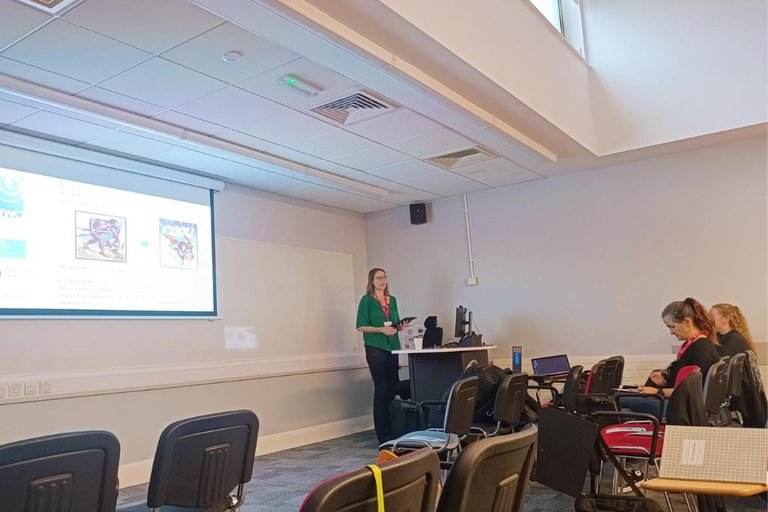
Susan Peeters
Deutscher Museumsbund e.V. (ASCHAFFENBURG, Germany 2024)
Humanness in reflection. Best practice: When citizenship meets researchers.
The talk was about cooperation with researchers, museums and citizens. What benefits does a citizen science project bring, what advantages can museums gain from working with citizens? The Paleo experts make it clear what a benefit motivated and committed citizens can be for museum projects. With the help of archaeological background knowledge and philosophical discourse, citizens can be trained in various scientific disciplines and sensitized to socially relevant topics.
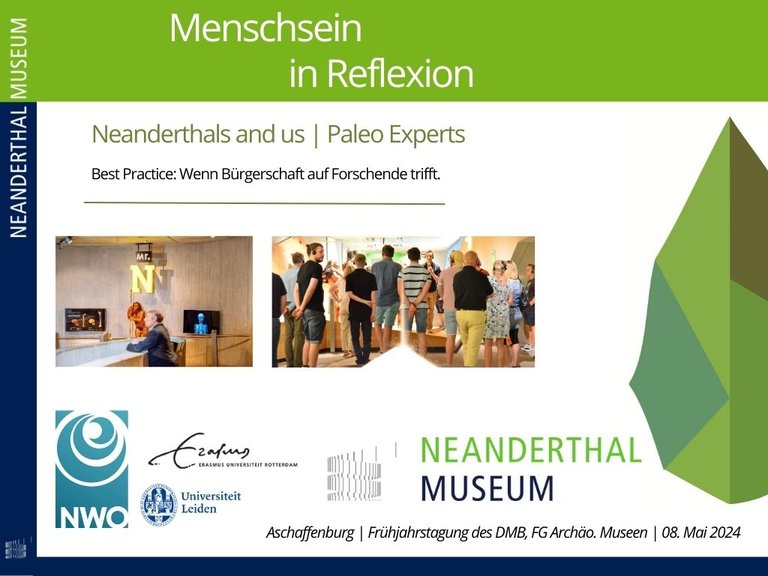
Dustin Welper
Contact: Dutin Welper M.Sc.
Archäotechnica (BRANDENBURG, Germany 2024)
Rethinking Our Stereotypes
Most of us carry an image of Neanderthals shaped by textbooks, films, and TV. But how accurate is it? Does our view reflect reality, or is it just a stereotype?
At Archäotechnica 2024, visitors shared their perceptions of Neanderthals, sparking fresh debates about these enduring images. With AI-generated visuals adding new layers to the discussion, participants explored just how much we still have to learn about our ancient relatives.
Dustin Welper
Contact: Dutin Welper M.Sc.
Blog: Meetingpoint-Potsdam
Podcast: Denkmalzeit Archäotechnica 2024
EAA - European Association of Archaeology (ROME, Italy 2024)
Breaking the educational one-way road: The Paleo experts
It's usually a dream: an in-depth dialogue with a group of visitors about the neanderthal life style! But fluent conversations within tours and workshops are usually only brief and rare encounters. Within museums, the exchange of knowledge is mostly one-sided. Like a waterfall, years of study and learning paleolithic archaeology and human evolution pour down on the visitors, but you learn nothing about their opinions and feelings about what they have just learned. It is not easy to break up this one-way road.
The research project “Neanderthals and us” (2022-2025) is a cooperation between the Erasmus University Rotterdam (with Prof. Hub Zwart, PhD Student Susan Peeters), Leiden University (with Prof. Marie Soressi and PhD Student Karel Kuipers) and the Neanderthal Museum. It investigates the question of how our image of humanness changes when we learn more about Neanderthals. Within this project, Neanderthal Museum has decided to take a different approach to communication: by organizing the citizens' panel the “Paleo experts”.
In exciting workshops, not only do our “Paleo experts” learn something about paleolithic archaeology, Neanderthals and the museum, but also, we as researchers learn something from them. The participants add their different perspectives, new impressions and let us draw on a much larger and diversified pool of knowledge. This makes them an essential part of "Neanderthals and us".
Over the next 1.5 years, the "Paleo experts" will participate in the interactive events of “Neanderthals and us”, while meeting and discussing different researchers and artists from the field of philosophy and archaeology. In addition to the workshops, they are also invited to participate in blogposts and other documentation activities of the project.
In this talk, we will introduce the project and the Citizen panel, as well as the methods, workshops and insights of the participants.
Dustin Welper
Contact: Dutin Welper M.Sc.
ESHE - European Society for the Study of Human Evolution (ZAGREB, Coratia 2024)
Neanderthals as familiar strangers
At ESHE 2024, Susan Peeters presented Neanderthals as Familiar Strangers: Distinction Versus Connection. A Philosophical Approach, addressing the fundamental ambivalence in establishing identity: the balance between self-assertion and distinction alongside a deep-seated longing for connection. This ambivalence is also pertinent to paleoanthropological discourse and influences perspectives on both Neanderthals and human identity. Peeters highlighted how the current Western narrative, which emphasizes autonomy and exceptionality, not only presents scientific challenges but also fosters a one-sided view of humanity and entrenches persistent stereotypes. She greatly enjoyed the conference, exploring the vibrant city of Zagreb, and visiting the impressive Neanderthal sites Vindija Cave and Krapina.
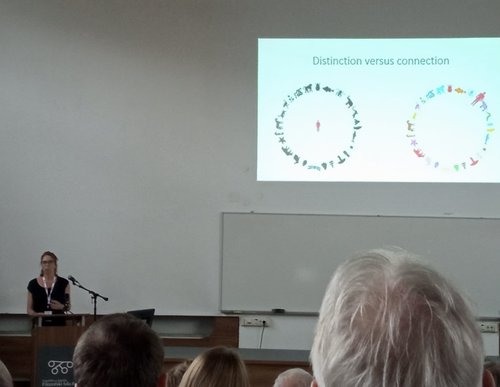
Susan Peeters
Funding and Cooperations
Funded by : Nederlandse Organisatie voor Wetenschappelijk Onderzoek.
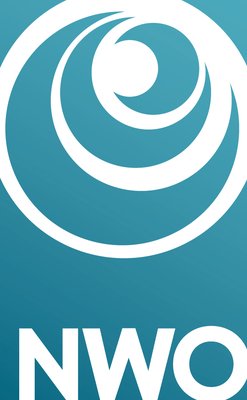
Stiftung Neanderthal Museum

Faculty of Arts, Erasmus Universiteit Rotterdam

Faculty of Archaeology, Leiden University
